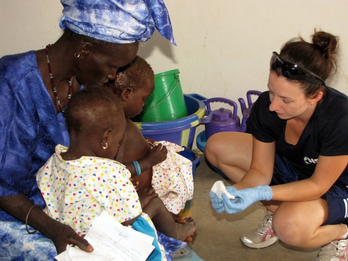re-thinking evangelism
Katie's story

Katie came to know Jesus Christ as Lord and Savior when she was only six years old. Shortly after her decision to follow Christ, Katie and her family moved to Richmond, Va. When the family moved into a new house, Katie prayed that God would send her some new friends. The next day there were about 14 little boys playing baseball in the cul-de-sac in front of Katie's house. She thought, "That is not quite how I wanted the Lord to answer my prayer. I will ask Him again." So, the following day, a six-year-old girl named Jackie was knocking on the front door. She lived two streets away from Katie. A few days later, as the two were playing in Katie's front yard, suddenly Katie ran through the front door of the house and hastily started upstairs. Her mother called out, "Katie why are you in such a hurry? What is going on?" Katie replied, as she looked into her mother's eyes, "Oh, mommy, I have just discovered that Jackie does not know one thing about Jesus. She must know and I must tell her. I am going to my room to get my Bible."
As explained in the "Fundamentals of Missions," the rationale for missions, and therefore evangelism, is that God is worthy of the worship of the nations. The ultimate value of salvation is not seen in what we are saved from, but it is what we are saved for that really matters. We are saved to worship God. Therefore, we are compelled to tell the world about this God who is worthy of their worship.
|
Are we cultivating a heart like Katie's? Do we believe that there is a great big world out there that does not know one thing about Jesus and our response is "they must know and I will tell them?"
|
When we think about evangelism, we usually see ourselves "declaring the gospel" - attempting to clearly and concisely articulate the message of salvation and sharing our testimony. Other times we might feel like we have to offer information in a logical sequence. But what if we chose instead to "dialogue the gospel"?
|
it's time to Re-think evangelism
Take a few minutes to watch the video below.
|
The cross-cultural worker who
witnesses effectively is the one who knows how to establish relationships quickly through finding the keys that open doors to sharing. |
This is what we call "Questioning Evangelism." It looks, sounds, and feels more like Jesus, the rabbi, than like Murray the used car salesmen. It involves more listening than speaking, inviting rather than demanding a decision. This kind of evangelism is answering questions with questions rather than giving answers. What if we looked to start a dialogue instead of giving a sales pitch? what if we started a conversation that led to more conversations, rather than a presentation that was over before it started?
Rather than try to learn all of the right words, have all the right booklets, anticipate all of the right questions, and memorize all of the right introductions and Scriptures, we should approach evangelism with wisdom. This means that we become people who live out the Gospel and speak of it freely because our hearts and minds have been captivated by it. It means we have spent time reading and studying the Word of God, praying, and learning what living out the Gospel really looks like. Then as we encounter people, our story and God's story comes out in our actions and words. Evangelism is not a sales pitch that we must perfect, but a way of living life to glorify God. |
|
BE YOURSELF
and yourself in a culturally relevant manner Paul never changed who he was or his message just how he delivered it. "To the weak I became weak, to win the weak. I have become all things to all people so that by all possible means I might save some." 1 Corinthians 9:22 USE A TOOL Evangelism is not a sales pitch, but there is wisdom in knowing effective ways to share your story and the Gospel. For your project you will receive a package of 10 chapsticks imprinted with gotquestions.org. Use the chapsticks as a way to give a person access to the Gospel in a very non-threatening way. Check out the Slovenia video to see how ISF teams hand out chapsticks while skiing and snowboarding. REVIEW AND PREPARE BEFORE DEPARTING FOR YOUR PROJECT OR COMING TO TRAINING CAMP: |
BUILD A BRIDGE
Connect daily activities and conversations to your story and the Gospel. Be an active listener. Questions allow you to see the world through their eyes and you are able to find out what is relevant to them. In conversation, point things back to Christ and tell your story. Adapt how you tell your story, not what you tell. |

